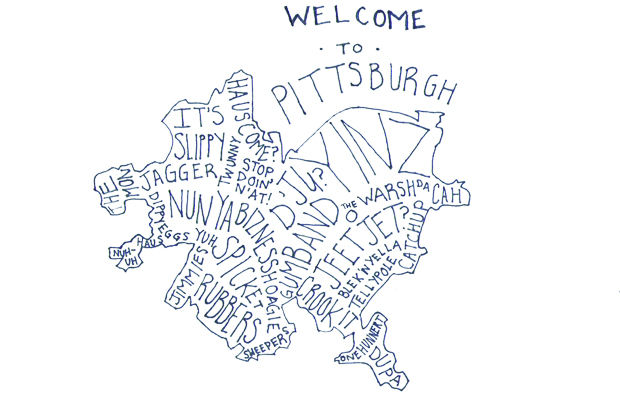Yinz get what I’m sayin’?


Your friends ask if yinz want to head dahn Sah-Syde to watch dem Stillers at da bah. Or maybe your mom asks you to red up your room and warsh your clothes, cause comp’ny is comin’. If you know what these people want, you’re probably from Pittsburgh.
Pittsburghers have their own style of speaking. Don Wadsworth, professor of voice and speech in the Carnegie Mellon University School of Drama, said it’s difficult to explain the Pittsburgh accent to someone who knows nothing about it.
“It comes from a mixture of Irish, Scottish, Polish and German influence,” Wadsworth said. “It’s very unique and hard to explain in just one sentence.”
According to Wadsworth, Pittsburghers speak with the musicality of the Irish. At the end of their sentences, their voices rise as if they were asking a question, even though they’re not. Other phrases like “red up your room” for clean up your room, come from Scottish slang for “readying up,” meaning to tidy up. Most Pittsburghers don’t even realize this phrase is uncommon in other regions.
Pittsburghese comes from convenience, according to Wadsworth. It’s easier to blend words together than saying each individually. As for diphthong vowels like in the word “town” — which has two vowel sounds in it, ah and oh — Pittsburghers skip out on the second sound and just use the first, making town sound like “tahn.”
Kyle Ortmeier grew up in South Dakota. Upon his arrival to Pittsburgh, Orthmeier noticed a difference in the way people in the city spoke.
“They used a lot of off-the-wall words,” said Ortmeier, a sophomore. “Like gum band and red up. It was like they had a southern twang that wasn’t quite there.”
Pittsburghese confused Ortmeier at first. He found asking people to clarify what they said to be the easiest solution.
He’s since noticed his own accent phasing out since living in Pittsburgh.
“I’ve stopped saying things like ‘jeepers!’” Ortmeier said.
Meg Taraban, a native Texan, experienced the same thing when she came to Pitt.
“I thought everyone talked so fast, and I couldn’t keep up,” Taraban said. “Every time I would say y’all, people would repeat it back to me, and I would be like, ‘no, this is normal.’”
Taraban, a junior studying nursing, said it took her a while to get used to the way people spoke, but she has remained loyal to her Texan accent.
Junior Anna Valliant grew up in Pittsburgh.
“[My accent] is slight Pittsburghese, but not full on yinzer,” said Valliant, a speech language pathology major.
She said she doesn’t use words like “yinzer” or “gum band” but owns up to blending her words together.
“When I say South Side, I say it like ‘sow-side,’ no ‘th’,” she said.
Sara Warsing grew up in the North Hills, and people have told her she has the Pittsburgh accent.
“People say I say my o’s weird and other things I say,” said Warsing, a sophomore neuroscience major.
For example, Warsing says things like “I’m going down South Side” instead of “I’m going to South Side” or “Can you ride me?” instead of “Can you give me a ride?”.
“If I’m trying to say that lately it seems like everyone’s a Steelers fan, I’ll say ‘Anymore everyone is jumping on the Steelers bandwagon,’” said Warsing. “And we push words together, I’ll say ‘didjagetit’ for ‘did you get it.’”
Taraban also noticed the way Pittsburghers push their words together.
“People don’t enunciate, everything blends together,” said Taraban. “It’s probably because they talk so fast.”
Recent Posts
‘He’s off to a much faster and better start’: Republicans reflect the second Trump administration’s first two months
Since Inauguration Day Trump’s second term has caused division amongst young Americans. Despite these controversies,…
Who Asked? // Why do we accept bad treatment from people?
This installment of Who Asked? by staff writer Brynn Murawski attempts to untangle the complicated…
What, Like It’s Hard? // Lean on your people
Contributing editor Livia LaMarca talks about leaning on your support networks and gives advice on…
Note to Self // Hot Girl Summer
In the sixth edition of Note to Self, Morgan Arlia talks about how she is…
A Good Hill to Die On // Down to Date and Time
In the latest version of “A Good Hill to Die On,” staff writer Sierra O’Neil…
‘Dress for Success: Closet to Career’ alleviates the stress of building a professional wardrobe
As the end of the spring semester rapidly approaches, many Pitt students find themselves in…

